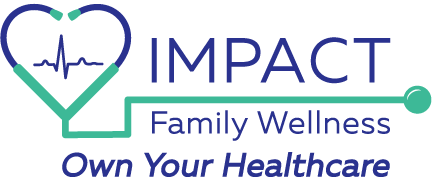8 Ways to Keep Your Heart Healthy and Prevent Heart Disease
Key Takeaways:
- A Heart disease is a leading cause of death but can often be prevented through lifestyle choices.
- Risk factors include genetics, age, poor diet, lack of exercise, and chronic stress.
- Eating a balanced diet and staying physically active are essential for heart health.
- Regular health screenings can help detect heart disease early and improve outcomes.
- Impact Family Wellness provides expert care and resources to support your heart health journey.
Your heart is the engine that keeps your body running. It pumps oxygen-rich blood to your organs, fuels your daily activities, and supports your overall well-being. But just like any engine, it needs proper care and maintenance to function at its best. Heart disease remains the leading cause of death worldwide. However, the truth is that many risk factors are preventable. Being mindful of your health and creating healthy habits allows you to create a defense to protect your heart and enjoy a vibrant, active life for years to come. At Impact Family Wellness, we believe in proactive healthcare and empowering our patients with the knowledge and resources to take charge of their heart health.
What is Heart Disease?
Heart disease is a broad term that refers to a range of conditions affecting the heart. The most common type is coronary artery disease (CAD), which occurs when plaque builds up in the arteries, restricting blood flow to the heart. This can lead to chest pain (angina), heart attacks, or other complications. Other forms of heart disease include heart failure, arrhythmias (irregular heartbeats), and congenital heart defects. These conditions can weaken the heart over time, making it difficult for the body to receive the oxygen and nutrients it needs. Understanding what heart disease is and how it develops is the first step in preventing it.
Who is at Risk of Heart Disease?
Several factors contribute to the risk of heart disease, some of which are within our control, while others are not. Age and genetics play a significant role—if you have a family history of heart disease, you may be more prone to developing it. Lifestyle factors also play an important part.
- Do you smoke?
- How is your diet?
- Do you drink alcohol excessively?
- Do you exercise?
- Are you in constant states of stress?
Conditions like high blood pressure, high cholesterol, diabetes, and obesity also contribute to heart disease. While some risk factors are unavoidable, maintaining heart-healthy habits can significantly reduce your chances of developing a heart condition.
8 Ways to Keep Your Heart Healthy
- Eat a Heart-Healthy Diet – Focus on whole foods rich in nutrients. Include plenty of fruits, vegetables, whole grains, lean proteins, and healthy fats like those found in nuts, seeds, and olive oil. Reduce your intake of processed foods, trans fats, and added sugars.
- Stay Active – Regular exercise strengthens your heart and improves circulation. Aim for at least 150 minutes of moderate-intensity exercise per week, such as brisk walking, cycling, or swimming. If you find something you enjoy doing, it will help you to be consistent and engaged.
- Manage Stress – Chronic stress increases blood pressure and inflammation, both of which can damage your heart. Modern day living comes with increased stress. Practice relaxation techniques like meditation, deep breathing, or yoga. Find things that are enjoyable and allow you to relax and nourish your nervous system.
- Maintain a Healthy Weight – Carrying excess weight puts strain on your heart and increases the risk of high blood pressure, diabetes, and cholesterol problems.
- Quit Smoking – Smoking damages blood vessels, increases blood pressure, and raises the risk of heart disease. If you need help quitting, seek support from healthcare professionals.
- Limit Alcohol Consumption – Excessive alcohol intake can raise blood pressure and contribute to heart disease. If you drink, do so in moderation—one drink per day for women and two for men.
- Get Quality Sleep – Poor sleep can lead to high blood pressure and obesity, both of which are risk factors for heart disease. Aim for 7-9 hours of quality sleep each night.
- Regular Health Screenings – Monitoring your blood pressure, cholesterol levels, and blood sugar regularly can help detect potential problems early. Work with your healthcare provider to keep these numbers in check and ensure a healthy heart.
Impact Family Wellness: Your Partner for a Healthy Heart
At Impact Family Wellness, we are committed to providing comprehensive, patient-centered care to help you achieve optimal heart health. Our team of dedicated healthcare professionals will work alongside you to create personalized wellness plans that address your unique needs. Whether you need guidance on nutrition, fitness, stress management, or medical screenings, we are here to support you every step of the way. Our Direct Primary Care memberships are a great way to support you and your family’s health accessibly, making sure that your hearts are healthy for years to come. Heart health is a lifelong journey, and we’re honored to be your trusted partner in preventing heart disease and promoting overall well-being. Take the first step toward a healthier heart today—schedule a consultation with Impact Family Wellness and let us help you live your best, healthiest life.
FAQs
Q: What are the early warning signs of heart disease?
A: Early signs may include chest pain, shortness of breath, fatigue, irregular heartbeat, and swelling in the legs or feet. If you experience these symptoms, seek medical attention promptly.
Q: How often should I have my heart health checked?
A: It depends on your risk factors. Generally, adults should have their blood pressure, cholesterol, and blood sugar levels checked at least once a year. Consult with your healthcare provider for personalized recommendations.
Q: Can heart disease be reversed?
A: While some damage may be irreversible, making healthy lifestyle changes can significantly improve heart function and prevent further complications. Managing risk factors like high blood pressure and cholesterol can help slow or stop disease progression.










